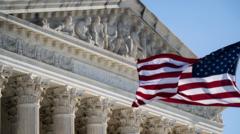In a significant development, President Donald Trump has escalated his challenge to federal bureaucracy by filing an emergency appeal with the Supreme Court. This appeal seeks to determine whether he possesses the authority to dismiss the head of the U.S. Office of Special Counsel, Hampton Dellinger, a position currently embroiled in controversy following Dellinger’s termination via a simple email this month.
Dellinger, nominated by former President Joe Biden, has taken legal action against the Trump administration, arguing that his dismissal violates federal law designed to protect the heads of independent agencies from removal unless there is clear evidence of "neglect of duty, malfeasance, or inefficiency." A lower court had previously issued a temporary ruling, allowing Dellinger to retain his position while the legal battle unfolds.
After the U.S. Court of Appeals in Washington D.C. denied the Trump administration's request to reverse the lower court's ruling, the Justice Department quickly moved to appeal this matter to the Supreme Court. This marks the first significant legal action involving the Supreme Court by the Trump administration since taking office last month.
Sarah M. Harris, acting solicitor general, articulated in the emergency filing that allowing lower courts to dictate employment decisions involving agency heads undermines executive power, asserting that no court in U.S. history has enforced an injunction to compel a president to retain an appointee against their wishes.
Alongside this legal challenge, Trump's administration has been orchestrating a wider effort to convert the federal workforce, resulting in the dismissal of over 9,500 federal employees and a voluntary buyout option extended to another 75,000 workers. This grand initiative has been nicknamed "Doge," spearheaded by Elon Musk's government efficiency task force.
As this contentious scenario unfolds, Trump's existing policies on immigration, gender issues, and federal spending face multiple lawsuits in lower courts, and it is anticipated that these disputes may also reach the Supreme Court in due course.
Dellinger, nominated by former President Joe Biden, has taken legal action against the Trump administration, arguing that his dismissal violates federal law designed to protect the heads of independent agencies from removal unless there is clear evidence of "neglect of duty, malfeasance, or inefficiency." A lower court had previously issued a temporary ruling, allowing Dellinger to retain his position while the legal battle unfolds.
After the U.S. Court of Appeals in Washington D.C. denied the Trump administration's request to reverse the lower court's ruling, the Justice Department quickly moved to appeal this matter to the Supreme Court. This marks the first significant legal action involving the Supreme Court by the Trump administration since taking office last month.
Sarah M. Harris, acting solicitor general, articulated in the emergency filing that allowing lower courts to dictate employment decisions involving agency heads undermines executive power, asserting that no court in U.S. history has enforced an injunction to compel a president to retain an appointee against their wishes.
Alongside this legal challenge, Trump's administration has been orchestrating a wider effort to convert the federal workforce, resulting in the dismissal of over 9,500 federal employees and a voluntary buyout option extended to another 75,000 workers. This grand initiative has been nicknamed "Doge," spearheaded by Elon Musk's government efficiency task force.
As this contentious scenario unfolds, Trump's existing policies on immigration, gender issues, and federal spending face multiple lawsuits in lower courts, and it is anticipated that these disputes may also reach the Supreme Court in due course.





















